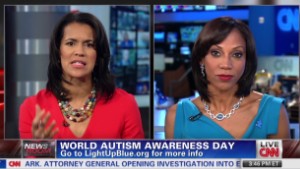Editor's note: John Elder Robison is the author of three books on autism, including "Raising Cubby," a memoir of being a father with Asperger's raising a son who also has Asperger's. He serves on review boards for the Centers for Disease Control and Prevention, the National Institutes of Health, and Autism Speaks and is a member of the Interagency Autism Coordinating Committee of the Department of Health and Human Services.
(CNN) -- This is Autism Awareness Month, and it's a good time to set the record straight on autism and violence.
After Sandy Hook, there was a lot of talk about whether shooter Adam Lanza had Asperger's syndrome, a form of autism, and, if so, whether that played a role in his violent behavior. The response from people touched by autism and autism professionals was immediate and unequivocal: There is no connection between any autism spectrum disorder and violent aggression.
Unfortunately, stating the facts did little to stop the speculation. It's almost as if people wanted to "make it so" as an easy way to explain the inexplicable. Every new story seemed to mention Asperger's in the headline or opening lines. The implied connection was unmistakable.
 John Elder Robison
John Elder Robison The truth is, people with autism are far more likely to be victims of violence than perpetrators. Even in our supposedly enlightened society, anyone who is different can become a magnet for bullies and predators. Growing up with undiagnosed Asperger's, I learned that the hard way. So did my son, Jack (I call him Cubby), who also has Asperger's. I'd sensed that all my life, but it's also supported by scientific studies, in both medical and criminal justice research.
Opinion: I have Asperger's and I'm just like you
Become a fan of CNNOpinion Stay up to date on the latest opinion, analysis and conversations through social media. Join us at Facebook/CNNOpinion and follow us @CNNOpinion on Twitter. We welcome your ideas and comments.Those of us on the autism spectrum have enough problems simply being different in an often intolerant world. Thanks to our limited sense of the emotions swirling around us, we live in the shadow of often unseen threats, as so many of us have learned to our detriment. The unspoken emotional subtext that most people take for granted is mysterious and invisible to us. Our oblivion leads to bad feeling, and we never know exactly how and where we went wrong.
Media talk of Asperger's and murder -- even when it's only speculation -- raises that threat level significantly. Insinuations like this dehumanize people with Asperger's and label us as "sociopaths" or "future attackers." Where does that lead? Exclusion, bullying and mistreatment, even more than before.
Prejudice affects us in many ways, most all of which are bad. My son found that out four years ago, when a state prosecutor decided that his scientific fascination with explosives was a terrorist threat and only she could "save" our community. She charged him with four felonies, carrying a maximum sentence of more than 60 years in prison.
Cubby was 17 years old when he was indicted. He'd never been in trouble with either the law or in school, and was on track to make Eagle Scout, where he taught the chemistry merit badge course.
His only "crime" was turning household chemicals into experimental explosives, which he set off and filmed in the woods behind our house. Even the ATF agents who first investigated were impressed by Cubby's scientific acumen and curiosity and certain that he intended no harm.
 World Autism Awareness Day
World Autism Awareness Day  New exercise for adults with autism
New exercise for adults with autism  Dr. Drew: Shooter's mom was in denial
Dr. Drew: Shooter's mom was in denial It took a year of our lives, $100,000 and a weeklong jury trial to set the record straight. At the end the prosecutor just walked away, as do most bullies and predators. Our society can be awful long on prejudgment and woefully short on consequences.
It's time to change the conversation.
Asperger's doesn't make a person a killer or a terrorist. It's the disturbing truth that anyone can turn violent or deadly, and it's proven very difficult to identify who's vulnerable and what the trigger might be.
Psychologist Phil Zimbardo showed that we all have a dark side, one that can emerge quite suddenly, in his famous Stanford Prison Experiment, which was cut off early when students who played prison guards became sadistic and those who played prisoners became depressed.
Indeed, most of the rampage killers of the past 30 years apparently popped up out of nowhere. What did we miss? The central question for us as a society should be: How can we identify those people at risk for aggressive violence, and get them support while help is still an option?
I believe violence should be a research priority at the Centers for Disease Control and Prevention and the National Institutes of Health. After the fact analysis doesn't help anyone, and it won't bring back the dead. We need to understand what makes people turn on others and how we can defuse that threat.
At the same time, we must learn to stop the rush to judgment when the person next to us acts "a little strange." Eccentric people have brought humanity some of its greatest gifts and inventions, and we need to encourage difference, not chase it into hiding.
Imagine where we'd be today if Alfred Nobel, who invented dynamite, had been prosecuted like my son -- instead of praised for his service to humanity.
Follow @CNNOpinion on Twitter.
Join us at Facebook/CNNOpinion.
{ 0 comments... read them below or add one }
Post a Comment